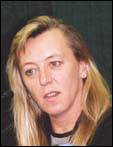|
The Nobel Peace Prize 1997
 The Norwegian Nobel Committee has decided to award the Nobel Peace Prize for 1997,
in two equal parts, to the International Campaign to Ban Landmines (ICBL)
and to the campaign's coordinator Jody Williams for their work for the
banning and clearing of anti-personnel mines.
The Norwegian Nobel Committee has decided to award the Nobel Peace Prize for 1997,
in two equal parts, to the International Campaign to Ban Landmines (ICBL)
and to the campaign's coordinator Jody Williams for their work for the
banning and clearing of anti-personnel mines.There are at present probably over one hundred million anti-personnel mines scattered over large areas on several continents. Such mines maim and kill indiscriminately and are a major threat to the civilian populations and to the social and economic development of the many countries affected. The ICBL and Jody Williams started a process which in the space of a few years changed a ban on anti-personnel mines from a vision to a feasible reality. The Convention which will be signed in Ottawa in December this year is to a considerable extent a result of their important work. There are already over 1,000 organizations, large and small, affiliated to the ICBL, making up a network through which it has been possible to express and mediate a broad wave of popular commitment in an unprecedented way. With the governments of several small and medium-sized countries taking the issue up and taking steps to deal with it, this work has grown into a convincing example of an effective policy for peace. The Norwegian Nobel Committee wishes to express the hope that the Ottawa process will win even wider support. As a model for similar processes in the future, it could prove of decisive importance to the international effort for disarmament and peace. October 10, 1997
|